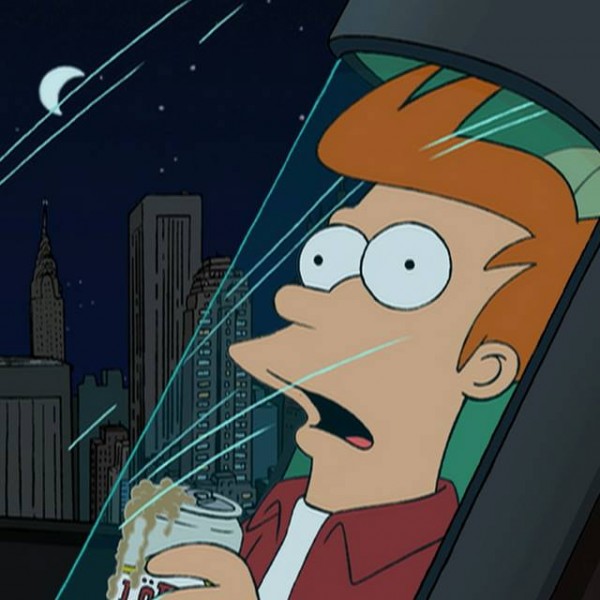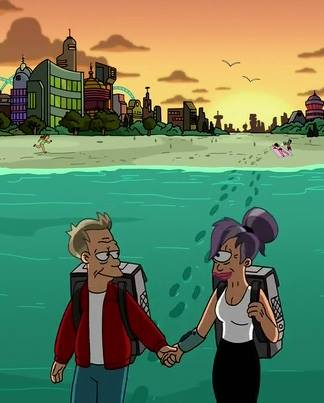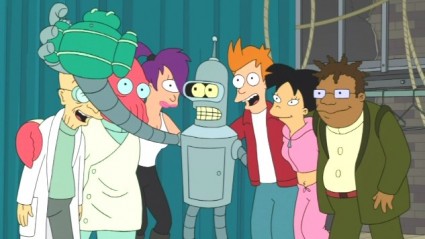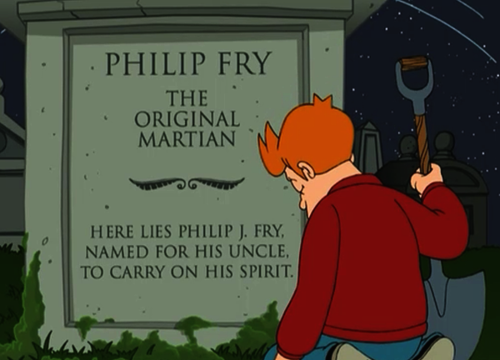4 Reasons Futurama Remains a Timeless Classic
"Torn from tomorrow's headlines"
Although
Futurama took its final bow two years ago, the series remains in viewers' hearts and on syndication on several stations, including Comedy Central. From 1999 to 2013, over seven seasons and four straight-to-DVD movies, Matt Groening's masterpiece cemented itself in TV history with Emmy wins, critical acclaim, and a diehard fanbase who stayed loyal to the show through multiple cancellations and network changes.
Futrama fans adore the show so much that some dedicated fans even translated the show's alien language to decode Easter eggs and inside jokes hidden throughout various episodes.
There are plenty of reasons why
Futurama has touched the hearts of TV viewers of all ages, including this writer. So, let's take a look at some of the many reasons why
Futurama is a timeless classic, and why it's safe to say that it's the best animated sci-fi series in television history.
[caption id="attachment_75900" align="aligncenter" width="374"]

Fry unwittingly gets cryogenically frozen in the series premiere, "Space Pilot 3000."[/caption]
The Unlikely Hero Philip J. Fry
From the pilot episode, Fry is shown to be a down-on-his-luck character. He's an underachiever working as a pizza delivery boy, riding his bicycle all over New York City. His family and friends never expected much of anything from him. In his new life in the 30th century, in New New York, he's the same guy. He's lazy, goofy, and simple-minded. His coworkers at Planet Express have low expectations of him. But because of his new job where he makes deliveries all over the universe, he runs into situations where his bumbling personality actually comes in handy. His kind and well-meaning nature gets put to the test in precarious and dangerous situations. Over the course of the series, Fry saves the Earth, the solar system, the space time continuum, and even the entire universe. Through all seven seasons, Fry has believable character development and becomes more well-rounded. When Fry doesn't stumble his way into the role of the hero, he proves himself to have a heart of gold. Fry has sacrificed himself multiple times to protect his friends and the person he cares about the most, Leela. Fry is a likable and relatable character who rises to the challenge and always does the right thing, even when he might not fully understand what's happening. Fry is the "everyman" who's the heart of the show.
[caption id="attachment_75899" align="aligncenter" width="307"]

Fry and Leela in the series finale, "Meanwhile."[/caption]
Fry and Leela's Relationship
Even though Fry is a guy from 1999 and Leela is a one-eyed cyclops lady, the two of them have a lot in common. Fry and Leela are both completely alone in the 30th Century. Fry's family and friends from 1999 are long dead, and Leela grew up as an orphan, and believes she's the only one-eyed alien on Earth. They're both lonely people. The two of them make this realization in the pilot episode. From season one onward, Fry has a crush on Leela and he tries to win her over, while she insists he's just a good friend and coworker. Because of their sometimes dangerous jobs, making deliveries all over the universe to all sorts of alien species, Fry and Leela have had to rescue each other from life and death situations numerous times. Eventually, Leela also falls for Fry. Over the course of the series, Fry and Leela have an on-again, off-again relationship. Fry and Leela have expressed their love to each other in some very grand gestures, like when Fry moved the stars to write a love note for Leela, and when Leela created stalagmites to write a romantic message for Fry. Fry even made a deal with the Robot Devil so he could create a beautiful opera dedicated to Leela. Fry and Leela's relationship is the main story arc of the series, and it reaches its heartwarming conclusion in the series finale "Meanwhile." In this fitting end to the series, Fry plans his romantic proposal to Leela, but thanks to another one of Professor Farnsworth's crazy inventions, Fry gets caught in a time loop and everyone in the world gets frozen in place except for Fry and Leela. The two of them grow old together. This was a brilliant way for the writers to focus on the main story arc, and to give fans the closure they wanted. Fry and Leela, through another crazy turn of events, finally had the happy ending they deserved.
[caption id="attachment_75889" align="aligncenter" width="425"]

The Planet Express crew taking a selfie.[/caption]
A Realistic Outlook on the Future
Futurama is the rare kind of science fiction story where it's neither dystopian nor utopian. In the world of
Futurama, in the 30th Century, even though science and technology have advanced to amazing heights, people still behave like, well, people. In New New York, the Tube Transport System takes people all over the city. Aliens and robots coexist among human Earthlings. Space flight is readily available, and spaceships transport goods and services throughout the universe, quicker than ever before. Human cloning is a realized technology. But even with all these amazing advances, humans still haven't overcome primitive traits like greed, gluttony, laziness, and violence. The society of New New York is still materialistic and wasteful. Corporations like Mom's Friendly Robot Company and Fishy Joe's behave unethically and damage the environment, while still raking in record-breaking profits. In the season four episode "Crimes of the Hot," Professor Farnsworth reveals that his invention the Sport-Utility Robot, the ancestor of modern robots, creates greenhouse gases and has contributed to global warming. Even though the series is set a thousand years in the future, and amazing technology is easily and readily available, human society hasn't fixed all of its problems. Technology hasn't made people more enlightened, and in some cases it actually enables human beings' laziness. This realistic outlook on the future is a refreshing take on sci-fi storytelling.
[caption id="attachment_75903" align="aligncenter" width="408"]

Fry discovers that his brother Yancy named his son after him in the season three episode "The Luck of the Fryrish."[/caption]
The Perfect Balance of Humor and Heart
Some of
Futurama's most beloved and memorable episodes are also the saddest ones. One of the most well-known episodes of the show, "Jurassic Bark," is an example of how the writers were able to create a perfect balance of humor and heart. In these kinds of episodes, the fans are reminded that Fry has lost a lot. His family and all the people he knew in the 20th Century are long dead. That is a lot for anyone to cope with. When Fry finds out he has the chance to bring his now-fossilized dog Seymour back to life through cloning, at first he is excited to be reunited with his loyal companion. But at the end of the episode, Fry believes that Seymour must have lived a long and happy life without him, so he tells Farnsworth to stop the cloning. In the most tear-jerking moment of the series, the writers break the viewers' hearts by showing a flashback sequence where Seymour waits for Fry outside Panucci's Pizza over many years, through the changing of the seasons, until Seymour becomes an old and gray dog. In the season three episode "The Luck of the Fryrish," Fry finds out that his brother Yancy, who he never used to get along with, named his son after him. Fry's nephew became the first person on Mars. In the season seven episode "Game of Tones," Fry gets a rare moment of closure when Nibbler transports Fry into his mother's dream, where he finally gets to see his mom again. The episode ends with Mrs. Fry waking up and glancing at her bedside photograph of her missing son. These touching moments in the show are some of fans' most memorable highlights. A comedy series like
Futurama was able to take its story seriously and give real depth to its plot and characters. That's a lesson future storytellers should take to heart, for generations to come.
 Fry unwittingly gets cryogenically frozen in the series premiere, "Space Pilot 3000."[/caption]
The Unlikely Hero Philip J. Fry
From the pilot episode, Fry is shown to be a down-on-his-luck character. He's an underachiever working as a pizza delivery boy, riding his bicycle all over New York City. His family and friends never expected much of anything from him. In his new life in the 30th century, in New New York, he's the same guy. He's lazy, goofy, and simple-minded. His coworkers at Planet Express have low expectations of him. But because of his new job where he makes deliveries all over the universe, he runs into situations where his bumbling personality actually comes in handy. His kind and well-meaning nature gets put to the test in precarious and dangerous situations. Over the course of the series, Fry saves the Earth, the solar system, the space time continuum, and even the entire universe. Through all seven seasons, Fry has believable character development and becomes more well-rounded. When Fry doesn't stumble his way into the role of the hero, he proves himself to have a heart of gold. Fry has sacrificed himself multiple times to protect his friends and the person he cares about the most, Leela. Fry is a likable and relatable character who rises to the challenge and always does the right thing, even when he might not fully understand what's happening. Fry is the "everyman" who's the heart of the show.
[caption id="attachment_75899" align="aligncenter" width="307"]
Fry unwittingly gets cryogenically frozen in the series premiere, "Space Pilot 3000."[/caption]
The Unlikely Hero Philip J. Fry
From the pilot episode, Fry is shown to be a down-on-his-luck character. He's an underachiever working as a pizza delivery boy, riding his bicycle all over New York City. His family and friends never expected much of anything from him. In his new life in the 30th century, in New New York, he's the same guy. He's lazy, goofy, and simple-minded. His coworkers at Planet Express have low expectations of him. But because of his new job where he makes deliveries all over the universe, he runs into situations where his bumbling personality actually comes in handy. His kind and well-meaning nature gets put to the test in precarious and dangerous situations. Over the course of the series, Fry saves the Earth, the solar system, the space time continuum, and even the entire universe. Through all seven seasons, Fry has believable character development and becomes more well-rounded. When Fry doesn't stumble his way into the role of the hero, he proves himself to have a heart of gold. Fry has sacrificed himself multiple times to protect his friends and the person he cares about the most, Leela. Fry is a likable and relatable character who rises to the challenge and always does the right thing, even when he might not fully understand what's happening. Fry is the "everyman" who's the heart of the show.
[caption id="attachment_75899" align="aligncenter" width="307"] Fry and Leela in the series finale, "Meanwhile."[/caption]
Fry and Leela's Relationship
Even though Fry is a guy from 1999 and Leela is a one-eyed cyclops lady, the two of them have a lot in common. Fry and Leela are both completely alone in the 30th Century. Fry's family and friends from 1999 are long dead, and Leela grew up as an orphan, and believes she's the only one-eyed alien on Earth. They're both lonely people. The two of them make this realization in the pilot episode. From season one onward, Fry has a crush on Leela and he tries to win her over, while she insists he's just a good friend and coworker. Because of their sometimes dangerous jobs, making deliveries all over the universe to all sorts of alien species, Fry and Leela have had to rescue each other from life and death situations numerous times. Eventually, Leela also falls for Fry. Over the course of the series, Fry and Leela have an on-again, off-again relationship. Fry and Leela have expressed their love to each other in some very grand gestures, like when Fry moved the stars to write a love note for Leela, and when Leela created stalagmites to write a romantic message for Fry. Fry even made a deal with the Robot Devil so he could create a beautiful opera dedicated to Leela. Fry and Leela's relationship is the main story arc of the series, and it reaches its heartwarming conclusion in the series finale "Meanwhile." In this fitting end to the series, Fry plans his romantic proposal to Leela, but thanks to another one of Professor Farnsworth's crazy inventions, Fry gets caught in a time loop and everyone in the world gets frozen in place except for Fry and Leela. The two of them grow old together. This was a brilliant way for the writers to focus on the main story arc, and to give fans the closure they wanted. Fry and Leela, through another crazy turn of events, finally had the happy ending they deserved.
[caption id="attachment_75889" align="aligncenter" width="425"]
Fry and Leela in the series finale, "Meanwhile."[/caption]
Fry and Leela's Relationship
Even though Fry is a guy from 1999 and Leela is a one-eyed cyclops lady, the two of them have a lot in common. Fry and Leela are both completely alone in the 30th Century. Fry's family and friends from 1999 are long dead, and Leela grew up as an orphan, and believes she's the only one-eyed alien on Earth. They're both lonely people. The two of them make this realization in the pilot episode. From season one onward, Fry has a crush on Leela and he tries to win her over, while she insists he's just a good friend and coworker. Because of their sometimes dangerous jobs, making deliveries all over the universe to all sorts of alien species, Fry and Leela have had to rescue each other from life and death situations numerous times. Eventually, Leela also falls for Fry. Over the course of the series, Fry and Leela have an on-again, off-again relationship. Fry and Leela have expressed their love to each other in some very grand gestures, like when Fry moved the stars to write a love note for Leela, and when Leela created stalagmites to write a romantic message for Fry. Fry even made a deal with the Robot Devil so he could create a beautiful opera dedicated to Leela. Fry and Leela's relationship is the main story arc of the series, and it reaches its heartwarming conclusion in the series finale "Meanwhile." In this fitting end to the series, Fry plans his romantic proposal to Leela, but thanks to another one of Professor Farnsworth's crazy inventions, Fry gets caught in a time loop and everyone in the world gets frozen in place except for Fry and Leela. The two of them grow old together. This was a brilliant way for the writers to focus on the main story arc, and to give fans the closure they wanted. Fry and Leela, through another crazy turn of events, finally had the happy ending they deserved.
[caption id="attachment_75889" align="aligncenter" width="425"] The Planet Express crew taking a selfie.[/caption]
A Realistic Outlook on the Future
Futurama is the rare kind of science fiction story where it's neither dystopian nor utopian. In the world of Futurama, in the 30th Century, even though science and technology have advanced to amazing heights, people still behave like, well, people. In New New York, the Tube Transport System takes people all over the city. Aliens and robots coexist among human Earthlings. Space flight is readily available, and spaceships transport goods and services throughout the universe, quicker than ever before. Human cloning is a realized technology. But even with all these amazing advances, humans still haven't overcome primitive traits like greed, gluttony, laziness, and violence. The society of New New York is still materialistic and wasteful. Corporations like Mom's Friendly Robot Company and Fishy Joe's behave unethically and damage the environment, while still raking in record-breaking profits. In the season four episode "Crimes of the Hot," Professor Farnsworth reveals that his invention the Sport-Utility Robot, the ancestor of modern robots, creates greenhouse gases and has contributed to global warming. Even though the series is set a thousand years in the future, and amazing technology is easily and readily available, human society hasn't fixed all of its problems. Technology hasn't made people more enlightened, and in some cases it actually enables human beings' laziness. This realistic outlook on the future is a refreshing take on sci-fi storytelling.
[caption id="attachment_75903" align="aligncenter" width="408"]
The Planet Express crew taking a selfie.[/caption]
A Realistic Outlook on the Future
Futurama is the rare kind of science fiction story where it's neither dystopian nor utopian. In the world of Futurama, in the 30th Century, even though science and technology have advanced to amazing heights, people still behave like, well, people. In New New York, the Tube Transport System takes people all over the city. Aliens and robots coexist among human Earthlings. Space flight is readily available, and spaceships transport goods and services throughout the universe, quicker than ever before. Human cloning is a realized technology. But even with all these amazing advances, humans still haven't overcome primitive traits like greed, gluttony, laziness, and violence. The society of New New York is still materialistic and wasteful. Corporations like Mom's Friendly Robot Company and Fishy Joe's behave unethically and damage the environment, while still raking in record-breaking profits. In the season four episode "Crimes of the Hot," Professor Farnsworth reveals that his invention the Sport-Utility Robot, the ancestor of modern robots, creates greenhouse gases and has contributed to global warming. Even though the series is set a thousand years in the future, and amazing technology is easily and readily available, human society hasn't fixed all of its problems. Technology hasn't made people more enlightened, and in some cases it actually enables human beings' laziness. This realistic outlook on the future is a refreshing take on sci-fi storytelling.
[caption id="attachment_75903" align="aligncenter" width="408"] Fry discovers that his brother Yancy named his son after him in the season three episode "The Luck of the Fryrish."[/caption]
The Perfect Balance of Humor and Heart
Some of Futurama's most beloved and memorable episodes are also the saddest ones. One of the most well-known episodes of the show, "Jurassic Bark," is an example of how the writers were able to create a perfect balance of humor and heart. In these kinds of episodes, the fans are reminded that Fry has lost a lot. His family and all the people he knew in the 20th Century are long dead. That is a lot for anyone to cope with. When Fry finds out he has the chance to bring his now-fossilized dog Seymour back to life through cloning, at first he is excited to be reunited with his loyal companion. But at the end of the episode, Fry believes that Seymour must have lived a long and happy life without him, so he tells Farnsworth to stop the cloning. In the most tear-jerking moment of the series, the writers break the viewers' hearts by showing a flashback sequence where Seymour waits for Fry outside Panucci's Pizza over many years, through the changing of the seasons, until Seymour becomes an old and gray dog. In the season three episode "The Luck of the Fryrish," Fry finds out that his brother Yancy, who he never used to get along with, named his son after him. Fry's nephew became the first person on Mars. In the season seven episode "Game of Tones," Fry gets a rare moment of closure when Nibbler transports Fry into his mother's dream, where he finally gets to see his mom again. The episode ends with Mrs. Fry waking up and glancing at her bedside photograph of her missing son. These touching moments in the show are some of fans' most memorable highlights. A comedy series like Futurama was able to take its story seriously and give real depth to its plot and characters. That's a lesson future storytellers should take to heart, for generations to come.
Fry discovers that his brother Yancy named his son after him in the season three episode "The Luck of the Fryrish."[/caption]
The Perfect Balance of Humor and Heart
Some of Futurama's most beloved and memorable episodes are also the saddest ones. One of the most well-known episodes of the show, "Jurassic Bark," is an example of how the writers were able to create a perfect balance of humor and heart. In these kinds of episodes, the fans are reminded that Fry has lost a lot. His family and all the people he knew in the 20th Century are long dead. That is a lot for anyone to cope with. When Fry finds out he has the chance to bring his now-fossilized dog Seymour back to life through cloning, at first he is excited to be reunited with his loyal companion. But at the end of the episode, Fry believes that Seymour must have lived a long and happy life without him, so he tells Farnsworth to stop the cloning. In the most tear-jerking moment of the series, the writers break the viewers' hearts by showing a flashback sequence where Seymour waits for Fry outside Panucci's Pizza over many years, through the changing of the seasons, until Seymour becomes an old and gray dog. In the season three episode "The Luck of the Fryrish," Fry finds out that his brother Yancy, who he never used to get along with, named his son after him. Fry's nephew became the first person on Mars. In the season seven episode "Game of Tones," Fry gets a rare moment of closure when Nibbler transports Fry into his mother's dream, where he finally gets to see his mom again. The episode ends with Mrs. Fry waking up and glancing at her bedside photograph of her missing son. These touching moments in the show are some of fans' most memorable highlights. A comedy series like Futurama was able to take its story seriously and give real depth to its plot and characters. That's a lesson future storytellers should take to heart, for generations to come.